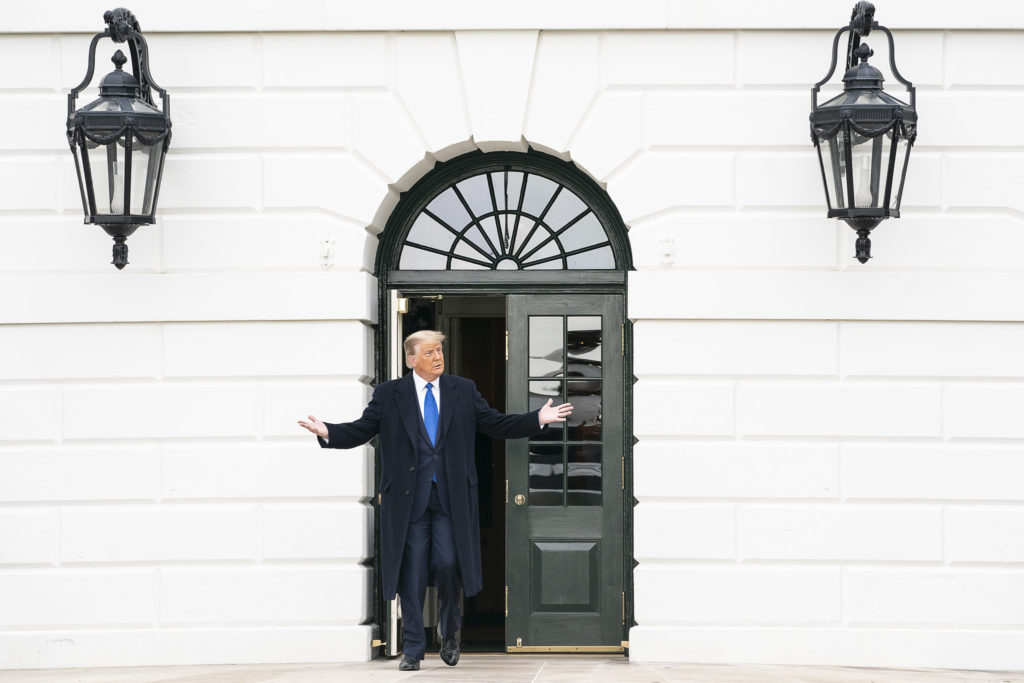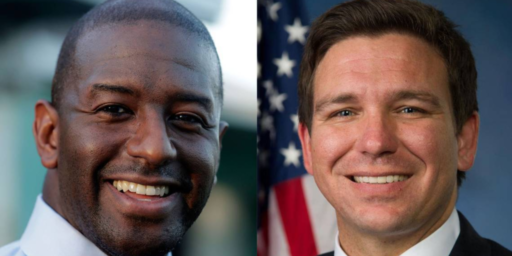Weak Parties, Part Gazillion
"The GOP" is not a singular unit.

I have had a piece from the Politico magazine sitting in an open tab for over a week because I knew it needed more attention than just putting it in a tab-clearing post. The story is entitled “The GOP Is Starting to Plot Against Donald Trump” and it immediately triggered in my head two related thoughts. The first is that we, collectively, can’t come to grips with what “The GOP” really means and that the general weakness of American parties as organizations means plotting against Trump is not as easy as it sounds.
The piece starts out talking about a prominent donor who articulates the problem as he sees it (and that forms the basic thesis of the piece):
“It is,” he said, “A five-alarm fire. And there is nobody coming to put it out.”
“It,” in this case, is the possibility that once again Donald Trump will prevail over a splintered Republican field, getting the same 30-40 percent he received in the early primaries in 2016, enough to win the nomination. “He,” is a Republican donor and bundler, a Wall Street financier who regularly hobnobs with senior Republican officials but who also was, uniquely for his tribe, an early and enthusiastic supporter of Trump. His request for anonymity speaks to the bizarreness of this political moment, where even one time staunch supporters of the former president are reluctant to say out-loud what they and their cohort all say privately: That should the former president win the primary again, he would be very likely to lose again to Joe Biden, even as some polls show him besting his 2020 rival.
Let me state that fearing a Trump loss is reasonable. He has never won the popular vote and the general electoral fortunes of his party appear to have been damaged because of his prominence. But I will also say that simply as a matter of reality, he may still be the party’s best shot. He has an enthusiastic following and let’s face facts, it is really hard to see Haley, Pence, or Pompeo storming to success. I will agree that DeSantis is a possibility, but I have to wonder what a DeSantis candidacy would look like if he first had to fight it out with Trump very publicly in the primary process (and I remain skeptical that DeSantis would prevail in that fight).
Having said that, I will note that the piece adds donor types to the list of “The GOP”:
It is a comment echoed in interviews with dozens of Republican party members, donors, strategists and grassroots leaders, many of whom say it is the conversation they are all having privately among themselves too — how to make sure that Trump doesn’t once again take advantage of a split field and walk away with the Republican nomination, costing the party not just the presidency but a chance to retake the Senate and hold on to the House. Just this week, both the Koch Brothers-affiliated Americans For Prosperity and the anti-tax behemoth Club for Growth signaled that they were looking to rally around a Trump-alternative. And with the Iowa Caucus now just 11 months away, party insiders say that this question — how to stop Trump — is the one they need to find an answer to before too many contenders start piling into the race.
It is a sign that the parties, as actual organizations which allegedly pick candidates to carry a party banner and platform, as quite weak.
So, on one level the money people are part of the party-as-organization, broadly defined. Of course, a large part of the reason this is true is that our parties are candidate-centric, and those candidates are largely self-selected, and therefore empowerment of a given candidate can come directly from donor to candidate. It is a key way the show that the formal party organization is far less important than the more informal structures.
The pathway that Americans for Prosperity to try and fund someone else is the same pathway that allows Trump to campaign on his own. It is because “The GOP” does not exist in any centralized way. It is a combination of individual candidates, individual donors, and ultimately primary voters. The RNC is ancillary, at best, and is largely dependent on who the perceived leader of the party is at the moment, which is Trump being the former president with a second term still a possibility.
To the notion that stopping Trump is not as easy as it sounds, I think back to 2016, as does the piece.
It is also a conversation reminiscent of one many had before. Back in 2016, senior Republicans fretted that putting Trump on top of the ticket would spell certain doom. “If we nominate Trump, we will get destroyed,” later Trump acolyte Lindsey Graham notoriously tweeted. “And we will deserve it.” Those concerns proved to be unfounded, of course, as Trump prevailed over a split Republican field and then went on to defeat Hillary Clinton while Republicans held the House and Senate. But this time around, few Republicans think Trump can pull it off again, not after spending the last three years nursing his grievances over 2020, and especially not after his hand-picked candidates were walloped in the midterms.
To my broader point about the institutional weakness of the RNC itself, if the party (you know, “The GOP”) really wanted to stop Trump they would have had to have changed the rules of the primary, but they didn’t. As Mr. Anonymous Donor quoted at the beginning noted “the possibility that once again Donald Trump will prevail over a splintered Republican field, getting the same 30-40 percent he received in the early primaries in 2016, enough to win the nomination.” This is because the rules the Republican Party uses to allocate delegates heavily favor a candidate who can win middle-to-large pluralities in the early going. As I have noted before, Trump did not win the majority of votes cast in the 2016 primaries. He won a large plurality. He has never been able to muster majority support: not from within his party and not nationally. As I repeatedly underscore, we can all thank our institutions for Trump’s candidacy and presidency because they don’t actually require true majority support.
As the piece correctly notes:
One oddity of the current moment is that the weaker Trump seems, with federal and local investigations piling up and his campaign launch landing with a thud, the higher the chances that more possible candidates will launch their own bids, seeing a path to victory more likely. And the more candidates enter, the easier it becomes for Trump to win with an increasingly smaller share of the vote.
So, one question is whether multiple candidates will find money to run? Another is will donors agree on whom they wish to coalesce? The reality is, just like there is no unified RNC that makes binding decisions, there is no Council of the Monied that can make sure that people like Haley and Pence don’t get funding.
There may [ain’t no “may” about it, there is none-ed.] be no convening authority, but there are conversations among donors and party activists who point to how on the other side of the aisle, in 2020, nearly the entire remaining Democratic field dropped out almost at the same time and endorsed Biden. Republicans fret that there is no equivalent of a Nancy Pelosi or a Jim Clyburn in their party who can apply pressure to the dreams of would-be presidents. Still, donors are talking now about pooling money together once the primary gets under way in earnest and a true Trump alternative emerges.
“Donors have wised up,” said Liam Donovan, a GOP strategist. “That is the main control mechanism. There is not going to be oxygen for a lot of these guys, and there are not going to be resources.”
Again, consider this sentence: “There may be no convening authority, but there are conversations among donors and party activists”–like my snarky insert above notes, there is simply no convening authority, and the notion that “conversations” are enough is laughable. If anything, it isn’t like there aren’t sources of money out there outside of the group noted above.
Let’s think back to the coordination success in the 2020 Democratic primaries for a moment and consider the following factors:
- The party was facing s singularly unattractive candidate in Trump.
- Trump was more vulnerable than most incumbents since he had won with a popular vote inversion in the EC.
- Biden had a deep resume.
- There were no other obvious candidates in the pool to rally around, except maybe Sanders, but he had his own unique downsides, not the least which is he really wasn’t a Democrat (and could credibly be called a “socialist” in a campaign against him).
- The Democrats had highly skilled leaders with people like Pelosi and Clyburn to try and negotiate and lobby internally.
Does any of that scenario apply to the 2024 GOP? Indeed, the candidate with the best resume is basically the former president, like it or not. And there is no consensus among GOP elite politicians that there is someone to rally around aside from Trump. Does anyone see Kevin McCarthy managing to sway anyone about anything, let alone abandon Trump and rally around DeSantis or someone else?
Need I remind the crowd that the guy with the next best resume, Mike Pence, was considered done politically until Trump tapped him to be veep and currently a non-trivial number of likely GOP primary voters think that Pence betrayed the country by not blocking certification of the Electoral College in January of 2021?
It is possible that the donors will decide to back DeSantis, but that will not mean that the party elites will. McCarthy is clearly a self-serving coward who knows he owes Trump (and the coalition that keeps him Speaker is largely pro-Trump), so I cannot see him sticking his neck out for much of anything. McConnell might try to backroom some things, but I don’t see him as Pelosi or Clyburn in this context). All of that is to say the kind of coordination that happened from the Democrats in 2020 is unlikely for the Republicans in 2024. Trump will still have a constituency in ways that no non-Biden Democratic did.
The bottom line remains that the part of “The GOP” that matters most is the primary voter, and right now Trump has more than enough support in that group to make a significant run at re-nomination.
I will conclude and note that stuff like this just strikes me as pathetic:
“Trump can only offer four more years,” said Dave Wilson, the president of the Palmetto Family Council, an influential evangelical group in South Carolina. “How are we going to build a movement that goes beyond the next four years to the next eight years to the next twenty years, that parallels what we have seen over on the progressive side?”
I don’t know how Wilson voted in 2016 or 2020, but I will say this: Evangelicals and other groups that make up the Republican coalition had a chance to stop Trump and his corrosive effects on the party, and to broader American politics, in November of 2016. By then it was clear who Trump was and the only way to stop him was to not vote for Trump, whether that meant voting Democratic, third party, or abstaining. Once he became president, he was going to make s serious mark, and that is what he has done. Had he lost, the collective actors that make up the party would have largely turned away from the crazier elements of trumpism because when you lose, that’s the reaction. Winning in 2016 changed that, and losing in 2020 has had a negative effect on Trump’s brand, but it doesn’t take away the fact that he was President of the United States. And hence the conundrum that “The GOP” has at the moment.
Indeed, if the donor class really wants to be rid of Trump, the test will be if he gets the nomination to run against Biden. If they really want to flush the party of Trump for the long haul, they should sit out 2024. But, my guess is that they will decide a flawed GOP president is better than another Biden term, and it will be 2016 all over again from their perspective, and they will support Trump.
So, again, there is no “The GOP.” There are donors, who may or may not coordinate amongst themselves and with others. There is a party organization, but it is weak and significantly beholden to Trump as the former POTUS. There are party elites (most of whom are spineless). And there are primary voters, a large number of whom would appear to be poised to re-nominate Trump. We are largely in the same place with the Republican Party as we were in 2016.
And, BTW, Trump can tell the base, truthfully (imagine that!), that his SCOTUS nominees ended abortion rights in the country, and that he cut taxes and regulations when he was in office. If that doesn’t sound like a pathway into the hearts of a substantial foundation of primary voters, despite Trump’s other baggage, you aren’t paying attention to American politics.
A postscript as it pertains to what donors, Evangelicals, or other GOP constituencies might do in 2024 if Trump is renominated: Alito and Thomas are in their 70s. Roberts and Sotomayor are in their late 60s. How many of those slots might come open between January 2025 and January 2029?






And even in the election where he lost the least, a large part of that was an assumption by a lot of moderates that his public persona was, like most celebrities, largely an act and they did not react well when he got into office and it turned out that it was not an act.
@Stormy Dragon: Indeed. There were clearly some who thought he would become more “normal” once in office. That clearly did not come to pass, but he still got more votes in 2020 than he did in 2016. As such, if push comes to shove, I think that Republican elites and voters will vote for him again in 2024 if he is nominated.
The fact that Trump got more votes in 2020 than in 2016 should militate against the hysterical shrieks of “fraud.”
I think a large part of the hope that Trump would act normal in office was wishful thinking on the part of those who thought that Mattis, Kelly, McMaster, Tillerson, etc. would be able to control him.
And to complicate matters even more, we have a former Bush aide asserting that MTG is no longer a “fringe” Republican Not good news in any measurable way.
One kind of wonders why Republicans won’t try a second amendment solution to their Cheeto problem.
Or is that more of a Republiqan thing?
The twenty years of progressive movement building Dave Wilson is alluding to includes Trump’s 4 years and 2 terms of Bush II. Yet, he’s not wrong about the political trajectory. Movements play out over decades and they can withstand set-backs.
The Republican elites and voters will back the GOP nominee no matter who it is, even someone as evidently corrupt as Trump, because they’ve drunk their own kool-aid about the fundamental evil of the opposition. Battles with The Devil are existential, so sitting out – even once – is unacceptable to the GOP psyche.
If the GOP is not a singular unit, then it has multiple factions that must atone for their complicity in supporting, tolerating, or not stopping Trump from the damage he has done and continues to do to our democratic-republic.
@Kathy: I don’t think Republicans have a Cheeto problem. People who want to become Cheeto have a problem, but that’s a different issue.
@Chris: Still, how does on atone for a sin when the objection is to the sinner rather than to the sin itself?
Trump has been a complete success for the Mediaevalist Party — his SCOTUS appointments are doing their appointed job. He will have a much more lasting impact than Biden. His real constituency are happy with that, and will continue to support him. The rest of us suffer.
The Oligarch Party, that used to control the GOP, has done much less well. It’s really hard to have sympathy for them, or to care what their strategic decisions might be. They could have helped to prevent the Mediaevalist Spring, but they didn’t.